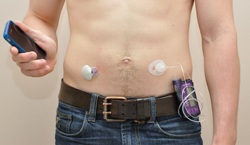
A Montréal research team, co-supervised by Dr. Rémi Rabasa-Lhoret from the IRCM (Adjunct Professor in the Department of Medicine (Division of Experimental Medicine) at McGill University) and Dr. Laurent Legault from the Montreal Children’s Hospital, undertook the first paediatric outpatient study to compare three alternative treatments for type 1 diabetes. The results, published this week in the scientific journal The Lancet Diabetes & Endocrinology, shows the dual-hormone artificial pancreas provides the most benefits by reducing the time spent in nocturnal hypoglycaemia.
The study conducted with children and adolescents with type 1 diabetes aimed to measure the effectiveness of three strategies in reducing nocturnal hypoglycemia. Taking place over multiple nights at a diabetes camp last summer, the trial compared conventional insulin pump therapy with two configurations of the external artificial pancreas being developed at the IRCM: the single-hormone (insulin alone) artificial pancreas and the dual-hormone (insulin and glucagon) artificial pancreas.
“The dual-hormone artificial pancreas has the potential to reduce hypoglycemia more than the other strategies, but the relative benefits provided by glucagon had not yet been assessed in outpatient settings,” says Dr. Rabasa-Lhoret, endocrinologist and clinical researcher at the IRCM. “Demonstrating the effectiveness of the artificial pancreas among children in an uncontrolled environment is an important step in making this technology available to the general public in the near future.”
